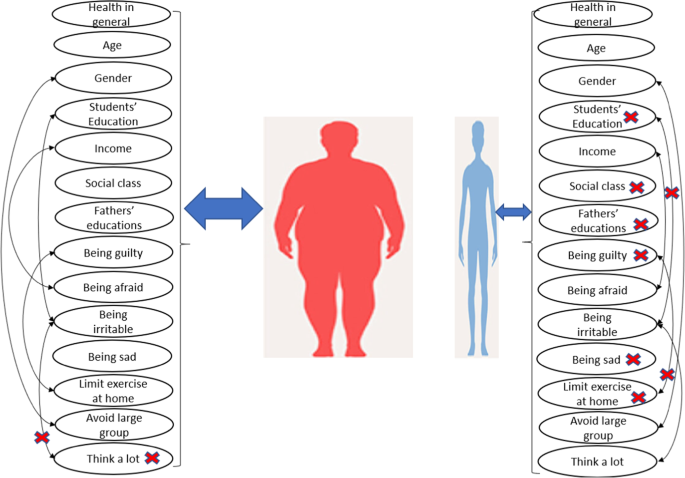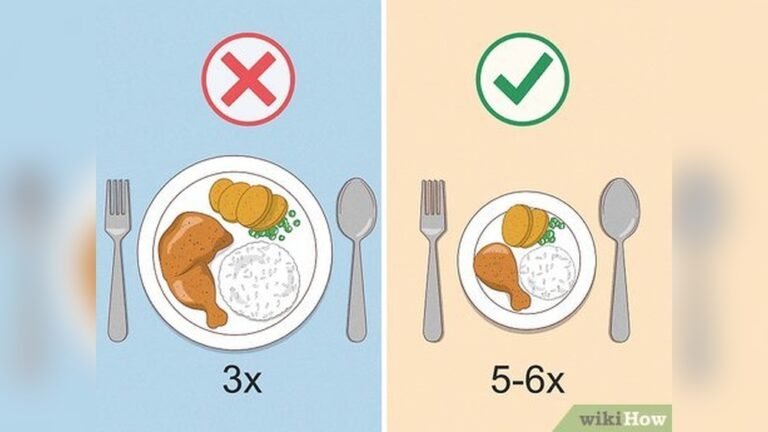Are you someone who eats a lot but still struggles to gain weight? It can be confusing and frustrating to see your friends and family put on pounds easily while you remain underweight despite your appetite.
You might wonder, “Why am I underweight but eat a lot? ” The answer isn’t always simple. Your body could be burning calories faster than you think, or there might be hidden health issues affecting how your body absorbs and uses food.
Understanding what’s really going on inside your body is key to finding the right solution. Keep reading to discover common reasons behind this puzzling problem and what steps you can take to finally reach a healthy weight.

Credit: www.nature.com
Fast Metabolism
Fast metabolism can explain why some people stay underweight despite eating a lot. It means the body burns calories quickly. This rapid calorie burn uses energy from food for daily functions and activity. The body does not store much fat, so weight gain is difficult.
How Metabolism Affects Weight
Metabolism is the process that turns food into energy. A fast metabolism burns calories faster than normal. This helps maintain or lose weight easily. People with fast metabolism need more calories to gain weight. Eating a lot may not lead to fat gain because the body uses the energy quickly. Metabolism speed varies from person to person. It depends on genetics, age, and activity level.
Signs Of A High Metabolic Rate
Some signs show a high metabolic rate. These include feeling warm often and sweating easily. People may feel hungry more frequently. They might have high energy levels and find it hard to gain weight. Rapid heartbeat and frequent bowel movements can also be signs. Knowing these signs helps understand why weight stays low despite eating more.
Physical Activity Levels
Physical activity plays a key role in why some people stay underweight despite eating a lot. The calories burned during movement can be much higher than expected. This makes it important to understand how daily activity affects your body’s energy use. Even small actions add up and increase calorie burn.
Hidden Calorie Burn
Many do not realize how many calories they burn outside of exercise. Walking, standing, fidgeting, and even talking use energy. This is called non-exercise activity thermogenesis (NEAT). People with high NEAT levels can burn hundreds of extra calories daily. This can cause them to stay thin despite eating large meals.
Impact Of Daily Movement
Daily activities like chores, commuting, or playing with children raise calorie use. Those who move frequently have a faster metabolism and burn more calories. Even small bursts of activity throughout the day add to total energy expenditure. This constant movement may explain why some remain underweight while eating well.
Genetic Factors
Genetic factors play a crucial role in body weight and metabolism. Some people inherit traits that make it hard to gain weight. These traits affect how the body processes food and stores fat. Understanding genetics helps explain why some stay underweight despite eating a lot.
Inherited Body Types
Body type is often passed down through families. Some inherit a lean or ectomorphic body type. This type burns calories quickly and stores less fat. People with this body type may appear thin even with high food intake. Their metabolism works faster, using energy efficiently.
Family History And Weight
Family weight patterns give clues about genetic influence. If close relatives are thin, it is common to share this trait. Genes affect metabolism speed, hunger, and fat storage. Knowing family history helps understand personal weight challenges. It shows that being underweight can be natural and not always unhealthy.

Credit: www.cigna.com.hk
Thyroid Issues
Thyroid issues can be a hidden reason for being underweight despite eating a lot. The thyroid gland controls how fast your body uses energy. When it works too fast, it can burn calories quickly. This may cause weight loss even if you eat plenty of food.
Hyperthyroidism Effects
Hyperthyroidism happens when the thyroid gland produces too much hormone. This speeds up your metabolism significantly. As a result, your body burns calories faster than usual. You may feel hungry all the time but still lose weight. Other effects include feeling nervous, sweating more, and having a fast heartbeat.
Symptoms To Watch For
Look out for symptoms like unexplained weight loss. You may also feel shaky or anxious without reason. Trouble sleeping and feeling tired often are common signs. Notice if your hands tremble or if you have frequent bowel movements. A swollen neck or enlarged thyroid gland can also appear.
Digestive Disorders
Digestive disorders can cause weight loss despite eating large amounts of food. These conditions affect the way your body absorbs and uses nutrients. When digestion is impaired, your body may not get enough energy and nutrients from food.
This can lead to being underweight even with a good appetite. Understanding these disorders helps explain why weight loss happens without obvious reasons.
Malabsorption Conditions
Malabsorption means the body cannot absorb nutrients well. It can occur due to damage in the intestines or enzyme deficiencies. Common causes include celiac disease and lactose intolerance.
In celiac disease, the immune system reacts to gluten, damaging the small intestine. This damage reduces nutrient absorption, causing weight loss. Lactose intolerance leads to poor digestion of dairy products, causing discomfort and poor nutrient use.
Common Digestive Diseases
Some digestive diseases interfere with nutrient absorption and digestion. Crohn’s disease causes inflammation in the digestive tract, leading to pain and poor nutrient uptake. Irritable bowel syndrome (IBS) affects bowel function and can cause weight loss if severe.
Other conditions like chronic pancreatitis reduce enzyme production needed for digestion. Without enough enzymes, food is not properly broken down, causing nutrient loss. These diseases often cause symptoms like diarrhea, abdominal pain, and fatigue.
Credit: www.quora.com
Mental Health Influences
Mental health plays a key role in body weight. Emotional and psychological states affect appetite and how the body uses energy. Stress and mood disorders can change eating habits and digestion. These changes might explain why some people stay underweight even when they eat a lot.
Understanding mental health influences helps in addressing weight issues more effectively. It is important to recognize the signs and seek support if needed. Below, two major mental health factors linked to weight loss are discussed.
Anxiety And Weight Loss
Anxiety triggers the body’s stress response, increasing metabolism. This can lead to faster calorie burning and reduced weight. People with anxiety often experience nausea or stomach discomfort. These symptoms lower appetite and food intake despite eating efforts.
Chronic anxiety also disrupts sleep, impacting hormone balance. Hormones like cortisol affect hunger and fat storage. High anxiety levels can cause muscle loss and fatigue. These effects contribute to difficulty gaining weight even with high food consumption.
Eating Disorders Impact
Eating disorders deeply affect weight and eating behavior. Conditions like anorexia nervosa and bulimia alter how the body processes food. Even if someone eats a lot, these disorders may cause poor nutrient absorption. This leads to underweight status despite high calorie intake.
Disordered eating can create a cycle of restriction and overeating. This harms metabolism and digestion over time. Recovery requires professional help to restore healthy eating patterns. Understanding eating disorders is vital to manage unexplained low weight effectively.
Other Medical Conditions
Several medical conditions can cause you to be underweight despite eating a lot. These conditions affect how your body absorbs food or uses energy. They may also increase your metabolism or cause unintentional weight loss. Understanding these medical issues helps in seeking the right treatment and care.
Diabetes And Weight Changes
Diabetes can cause weight loss even with a good appetite. High blood sugar levels make your body lose calories through urine. This leads to weight loss despite eating more food. Diabetes also affects how your body uses insulin, which impacts energy storage. People with uncontrolled diabetes often feel hungry but still lose weight. If you notice sudden weight loss with increased hunger, see a doctor for testing.
Cancer And Unintentional Loss
Cancer can cause unintentional weight loss and increased appetite. Tumors may use more energy, making your body burn calories faster. Some cancers affect digestion, reducing nutrient absorption. Treatments like chemotherapy can also reduce appetite or cause nausea. Weight loss linked to cancer often happens quickly and without trying. Early medical evaluation is important if you lose weight without explanation.
Diet Quality
Diet quality plays a key role in understanding why you may be underweight despite eating a lot. The types of foods you consume affect how your body gains weight or builds muscle. Eating large amounts of low-nutrient foods can leave your body lacking essential vitamins and minerals. This may hinder your ability to gain healthy weight.
Focusing on nutrient-rich foods helps your body use calories more effectively. Balanced meals with proteins, healthy fats, and carbohydrates support overall health. Poor diet quality can lead to missed opportunities for muscle growth and fat storage. Improving what you eat is often the first step toward healthy weight gain.
Nutrient Deficiencies
Eating a lot does not always mean eating well. Many people consume high-calorie foods that lack important nutrients. Missing vitamins and minerals can cause your body to struggle with weight gain. For example, low iron or vitamin D levels may reduce your energy and muscle strength.
Without enough nutrients, your metabolism may work harder to keep you alive. This can burn more calories and prevent weight gain. Foods rich in vitamins, minerals, and protein help your body build tissue and store energy. Check your diet for variety and include fruits, vegetables, nuts, and lean meats.
Building Muscle Mass
Muscle weighs more than fat and can help increase your body weight. Eating enough protein is crucial to build muscle mass. Protein provides the building blocks your body needs to repair and grow muscle tissue. Without it, even a high calorie intake may not lead to muscle gain.
Strength training combined with a nutritious diet promotes muscle growth. Focus on foods like eggs, chicken, fish, beans, and dairy. Include enough carbohydrates and healthy fats to fuel your workouts and recovery. Building muscle not only adds weight but also improves your overall health.
Assessing Activity Level
Assessing your activity level is crucial when trying to understand why you remain underweight despite eating a lot. Physical activity burns calories, and if you move a lot during the day, your body uses more energy. This can make it hard to gain weight even if your food intake seems high. Understanding how much energy you expend helps to balance your calorie intake and body weight.
Matching Calories To Movement
Your body needs calories for basic functions and extra for physical activities. If you are very active, your calorie needs rise significantly. Simple activities like walking, cleaning, or standing add up over time. You may burn more calories than you realize. Eating enough to cover these calories is essential to gain or maintain weight. Track your daily movements and compare them with your calorie intake. This helps to see if you need to eat more or adjust your activity.
When To Seek Medical Advice
Being underweight despite eating a lot can sometimes signal health issues. If you have high activity but still lose weight, consult a doctor. Medical conditions like thyroid problems or digestive disorders may affect weight. A healthcare professional can run tests and offer guidance. Early advice helps prevent further health problems. Never ignore unexplained weight loss or changes in appetite. Getting help ensures you stay healthy and safe.
When To See A Doctor
Understanding when to see a doctor is crucial if you remain underweight despite eating a lot. Persistent low weight can signal hidden health issues. Early medical advice can prevent complications and guide proper treatment.
Do not ignore warning signs like fatigue, weakness, or sudden weight loss. A healthcare professional can offer clear answers and support. Timely consultation helps find the cause and create a plan to improve your health.
Identifying Underlying Causes
A doctor will start by asking about your eating habits and lifestyle. They check for symptoms linked to medical problems like thyroid issues or digestive disorders. Mental health conditions also play a role and need evaluation.
Physical exams help spot signs of illness. Family history is important to discover inherited conditions. Identifying the root cause is key to effective treatment and better weight management.
Diagnostic Tests And Procedures
Doctors may order blood tests to check thyroid function and nutrient levels. Stool tests can detect digestive problems. Imaging tests like ultrasounds or X-rays reveal organ health.
Sometimes, more detailed tests such as endoscopy or biopsy are needed. These help find issues in the gut or other organs. Accurate diagnosis is essential to guide the right treatment and improve your weight safely.
Conclusion
Being underweight despite eating a lot can feel confusing. Your body might burn calories quickly or genetics may play a role. Sometimes, health issues affect how your body uses food. Paying attention to your diet quality and activity level matters a lot.
Talking with a doctor helps find the exact reason. Taking small steps to balance eating and health can improve your weight. Stay patient and listen to your body’s needs. Understanding your unique situation leads to better health and well-being.


